On January 7, the city of Paris was rocked by violence when masked gunmen laid siege to the offices of satirical publication Charlie Hebdo. The attack resulted in the death of 12 people, including 2 police officers. Hebdo had gained notoriety by previously publishing cartoons parodying Islam and the prophet Muhammad, similar to the controversy created by Dutch newspaper Jyllands-Posten in 2005. Drawing immediate worldwide attention, the devastating attack on the offices and staff of Charlie Hebdo has shocked the international community.
In the immediate aftermath, supporters of the publication adopted the slogan “Je Suis Charlie”, or “I am Charlie”, in solidarity with messages voiced by the late staff of Charlie Hebdo. A world-wide expression, “Je Suis Charlie” became as much a declaration of support for the magazine as a message for freedom of speech. This rallying cry drew massive crowds throughout the streets of Paris on the night of the attack, with the largest demonstrations occurring in Place de la République, with more in the following days throughout France. Many of the demonstrators could be seen with signs echoing the “Charlie” phrase, and calling for the continuation of free speech.
Protestors in Paris wave French flags and hold up signs reading “Je Suis Charlie”
Photo: Olivier Ortelpa/Wikimedia Commons
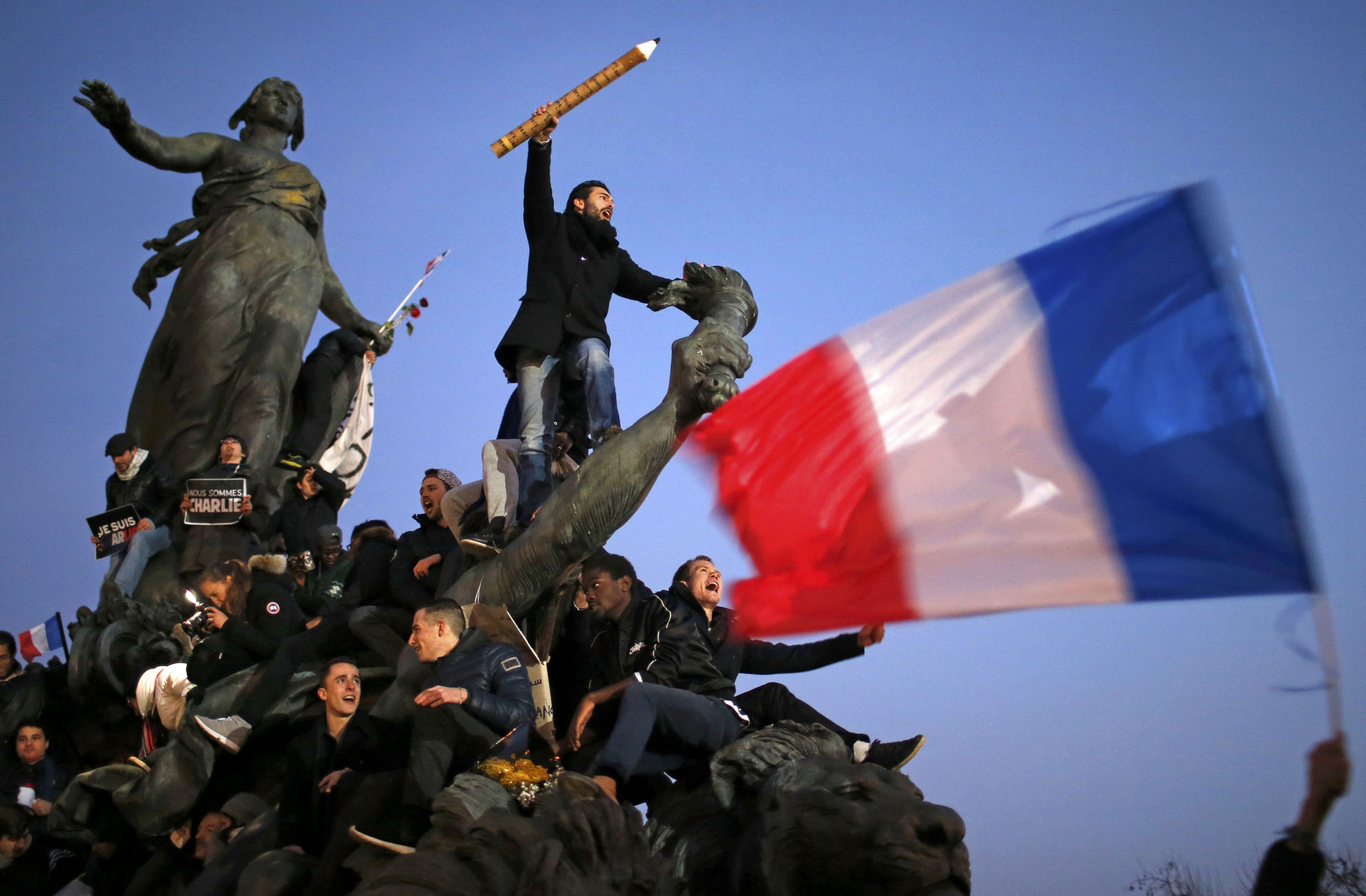
Demonstrators stand atop the Place de la Nation in a rallying cry of solidarity after the attacks
Photo: Stephane Mahe/Reuters
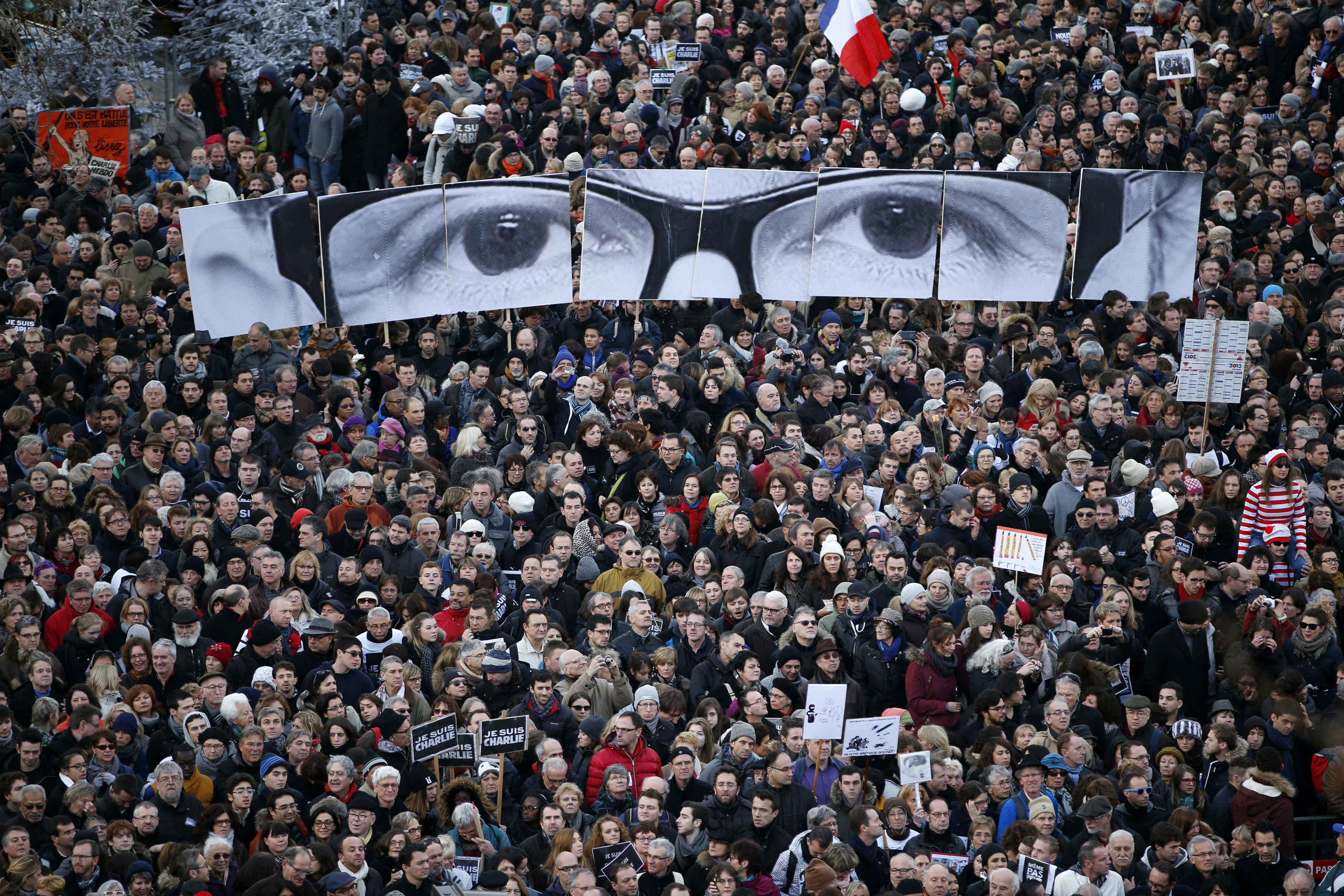
Parisian demonstrators hold up a large photograph of Charlie Hebdo editor Stephane Charbonnier
Photo: Charles Platiau/Reuters
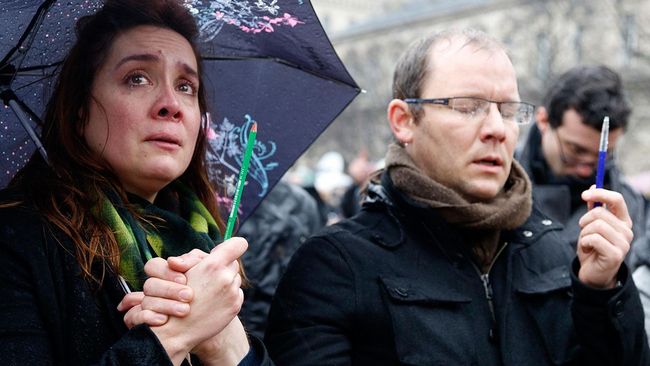
People hold up pens and pencils during a moment of silence in Paris
Photo: Jacky Naegelen/Reuters
The demonstrations spread quickly throughout Europe and the rest of the world. Gaining traction in multiple, cities, languages, and cultures, the shared sympathy for the brutal attacks drew millions of attendees to protests and vigils. From Paris to Tokyo, New York to Johannesburg, these demonstrations cemented the attacks at the forefront of global discussion. Leaders from foreign governments also shared their sympathies for the lives lost, as well as further condemning such actions of terrorism.
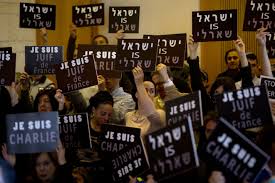
Israelis holding up signs reading “I am Charlie”, “I am a Jew of France,” and “Israel is Charlie”
Photo: Sebastian Scheiner/AP
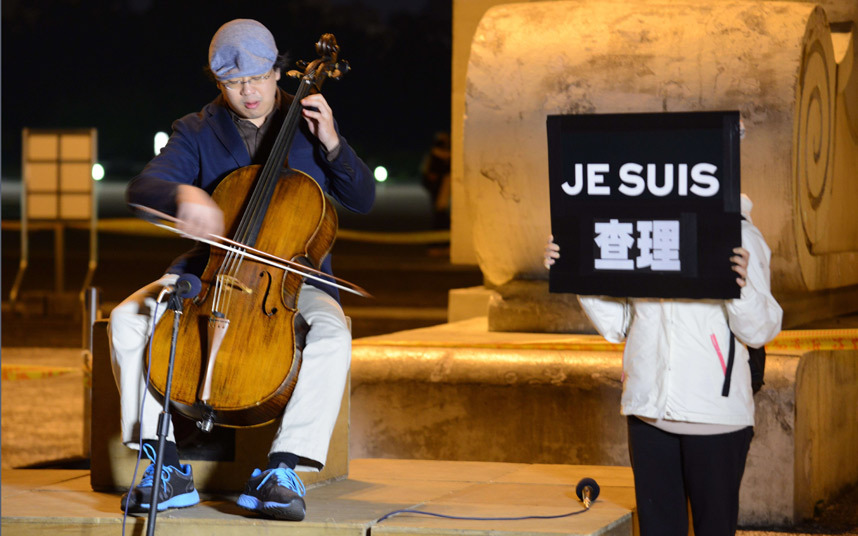
A man plays cello as people attend a rally in Taipei
Photo: Sam Yeh/AFP/Getty Images
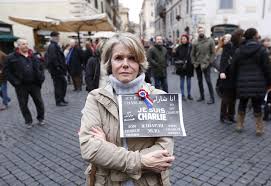
A woman wears a “je Suis Charlie” badge as demonstrators gather in Rome
Photo: Riccardo De Luca/AP
In addition to the physical response, the ever-current online world immediately took hold of “Je Suis Charlie”, creating one of the most shared twitter hashtags of all time. Through Twitter, Facebook, and other online media platforms, the messages have been even more proliferated to the far reaches of the globe. An official “Je Suis Charlie” app has also been released, allowing users to check-in via GPS to share their location and voice.
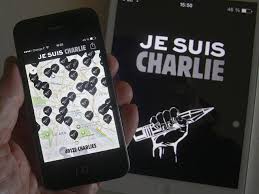
Photo: AP
While a period of mourning was observed for the journalists who lost their lives, much of the media attention now turns towards the motivation for the attack. In one of the available videos of the shooting, a gunman can be heard saying “We have avenged the Prophet Muhammad.” Indicating a perceived slight against the Prophet, the attack appears to have been carried out in revenge against the satirical publications of Hebdo.


a global affairs media network
In Pictures: “Je Suis Charlie” – A Global Message

February 26, 2015
On January 7, the city of Paris was rocked by violence when masked gunmen laid siege to the offices of satirical publication Charlie Hebdo. The attack resulted in the death of 12 people, including 2 police officers. Hebdo had gained notoriety by previously publishing cartoons parodying Islam and the prophet Muhammad, similar to the controversy created by Dutch newspaper Jyllands-Posten in 2005. Drawing immediate worldwide attention, the devastating attack on the offices and staff of Charlie Hebdo has shocked the international community.
In the immediate aftermath, supporters of the publication adopted the slogan “Je Suis Charlie”, or “I am Charlie”, in solidarity with messages voiced by the late staff of Charlie Hebdo. A world-wide expression, “Je Suis Charlie” became as much a declaration of support for the magazine as a message for freedom of speech. This rallying cry drew massive crowds throughout the streets of Paris on the night of the attack, with the largest demonstrations occurring in Place de la République, with more in the following days throughout France. Many of the demonstrators could be seen with signs echoing the “Charlie” phrase, and calling for the continuation of free speech.
Protestors in Paris wave French flags and hold up signs reading “Je Suis Charlie”
Photo: Olivier Ortelpa/Wikimedia Commons

Demonstrators stand atop the Place de la Nation in a rallying cry of solidarity after the attacks
Photo: Stephane Mahe/Reuters

Parisian demonstrators hold up a large photograph of Charlie Hebdo editor Stephane Charbonnier
Photo: Charles Platiau/Reuters

People hold up pens and pencils during a moment of silence in Paris
Photo: Jacky Naegelen/Reuters
The demonstrations spread quickly throughout Europe and the rest of the world. Gaining traction in multiple, cities, languages, and cultures, the shared sympathy for the brutal attacks drew millions of attendees to protests and vigils. From Paris to Tokyo, New York to Johannesburg, these demonstrations cemented the attacks at the forefront of global discussion. Leaders from foreign governments also shared their sympathies for the lives lost, as well as further condemning such actions of terrorism.

Israelis holding up signs reading “I am Charlie”, “I am a Jew of France,” and “Israel is Charlie”
Photo: Sebastian Scheiner/AP

A man plays cello as people attend a rally in Taipei
Photo: Sam Yeh/AFP/Getty Images

A woman wears a “je Suis Charlie” badge as demonstrators gather in Rome
Photo: Riccardo De Luca/AP
In addition to the physical response, the ever-current online world immediately took hold of “Je Suis Charlie”, creating one of the most shared twitter hashtags of all time. Through Twitter, Facebook, and other online media platforms, the messages have been even more proliferated to the far reaches of the globe. An official “Je Suis Charlie” app has also been released, allowing users to check-in via GPS to share their location and voice.

Photo: AP
While a period of mourning was observed for the journalists who lost their lives, much of the media attention now turns towards the motivation for the attack. In one of the available videos of the shooting, a gunman can be heard saying “We have avenged the Prophet Muhammad.” Indicating a perceived slight against the Prophet, the attack appears to have been carried out in revenge against the satirical publications of Hebdo.


